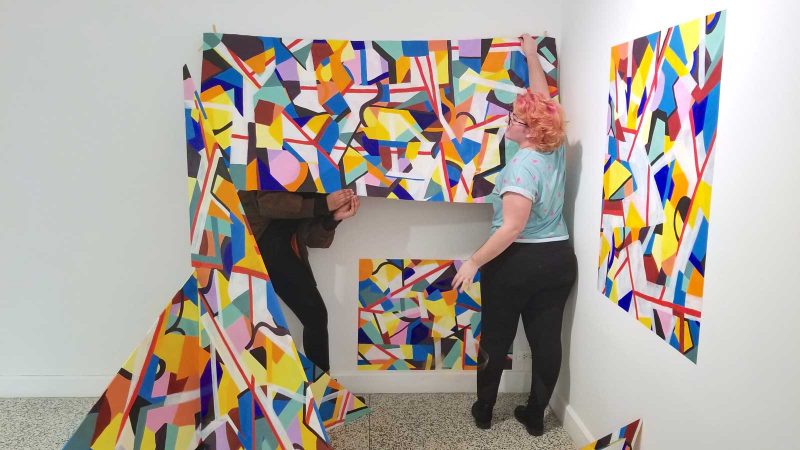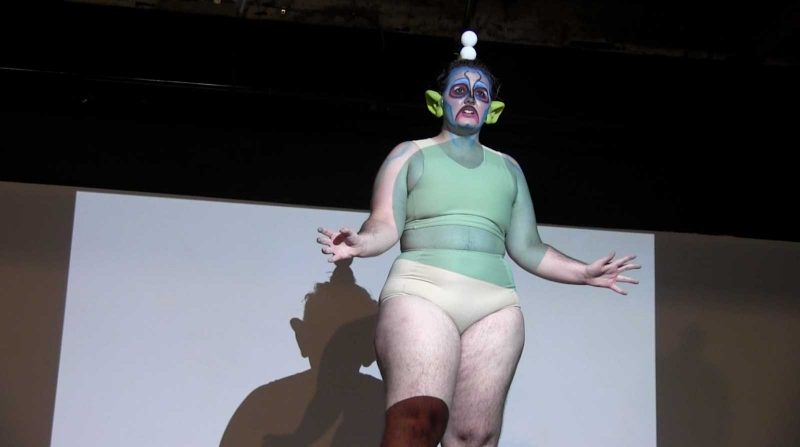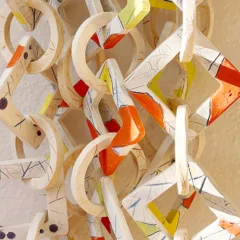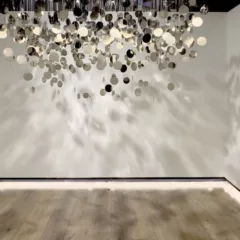
While Lee and I were cohabiting and creating the messiest studio in our school, we became close friends. I called her recently to ask about her life now as a manager of a local grocery store. Lee is the master of in-person storytelling. No one is immune from their dry humor and enthusiastic speaking style. I wonder sometimes if this skill is ever useful to her when talking to customers, or if it’s just a side of her no one sees 40 hours a week.
Lee has been working at their grocery store for about two years, about the same amount of time they’ve had a BFA in Fine Arts, and hasn’t made new art work since. Instead, they opted to spend time attending drag events (Haus and Transcend in particular) and to give the occasional performance. But since the pandemic, her participation in that community has stopped as well.
In our conversation we considered the realities our art world experiences, not quite landing on one truth or another. Do you believe there’s too much critique in art schools? That grocery store workers are heroes? It’s complicated™.
Art schools have failed when their graduates don’t make art
Logan Cryer: What do you think about people who think, “Oh no! We’ve failed this art student, who now is working full time and is disengaged in the artworld”?
Lee: I mean, I don’t see myself as a failure to the art world. I definitely needed a break from it. I do eventually want to return to making art but, to do that there’s a lot more steps to getting involved in the art world than there is in the drag world, which is why its a lot easier for me to do that first. I live in a really small house and I have roommates and cats so I don’t really have a lot of space to make the art that I would like to be making.
LC: You mean because you were making big installation work?
L: Yeah, but even if I were to scale it down, there’s still not enough room in my house. I’d have to get another studio space, which is another rent on top of my home rent—which I don’t have enough money to do—on top of the art supplies and the time I’d need to do anything.
LC: I know you said you wouldn’t want the art community to see you as a failure, but do you think people having the experience that you’re describing, disengaged and struggling, is that a sign that art culture is failing others?
L: For what it seems, it seems like a very pretentious scene to begin with. I think the ways in which the art world fails is that it takes a certain level of education to kinda be involved, it takes a certain level of economic status to kinda be involved, it takes a certain level of time, energy, and accessibility. It’s a privilege to be in the fine art community.
LC: We definitely had professors who repeatedly would talk about how there were people who don’t make art anymore and say, “Yeah, most of the people you graduate with won’t make art in five years.”
L: Yeah and I think that also put a level of responsibility on us and a fear of failure. The way it was brought up wasn’t, “You know some people don’t go on to make art and that’s okay.” It was like, “Look around! Half of the people in your class won’t be here!” Which is really scary because it felt like you needed to prove that you were one of the people that like took art seriously. It’s such a dumb way of thinking.
There’s too much criticism in art schools
L: I don’t think it’s healthy for anyone to be in a mode of criticism all the time. It’s easy to transfer criticism to every aspect of life—I know in college I was hypercritical of everything all the time.
LC: I feel like people in the art community can be so judgemental, not necessarily in a malicious way, but the culture is so much about critique. I wonder how that affects the way people feel like they don’t belong.
L: Yeah, definitely in the art scene it’s hypercritical, because that’s what art is about—at least in the fine art scene. At no point are you making a piece and not eventually thinking about critique. Yes, you can just enjoy the way something looks but, I’ve learned the point of art is going in and critiquing. Whereas when you’re doing things solely for entertainment, you’re not looking at it with such a critical eye.
LC: There’s been so many times when I’m going to an art show that I know I’m not going to like and then I see it and I don’t enjoy it. I’m not going out because I know I’m going to have a good experience, like I would if I went out for entertainment. It’s to confirm my criticality.
L: Exactly and I think that has kept me away from the fine arts scene for longer than anything. Trying to make art and trying to get it out there comes with just the knowledge that I’ll be getting critiqued again. Whereas when I do drag, no one is going to come up to me in my outfit and say, “This is bad and I’m gonna tell you why.” You know? It could be a bad outfit but, no one will tell me that. I can enjoy the time I’m spending and have a creative outlet without thinking, “Someone is going to tell me why this is bad eventually.”
You can be an artist and not make art
LC: I’m curious what you think about artists who aren’t working full-time or who aren’t essential workers who aren’t completing any creative projects?
L: I completely understand that. Especially right now. Even if someone’s not acknowledging it, this is such a high stress situation, even for people who are in their homes all day. If you’re stuck at home and you feel like you don’t have the energy to do things, then don’t do them. You don’t have to and no one’s forcing you right now to do anything. I think that’s good. Especially when a lot of people are forced to work constantly.
LC: I think a lot of artists struggle with making time to make work and now a lot of artists have nothing but time. Speaking for myself I sometimes feel like, “If you were really an artist you’d use this time you always said you don’t have.”
L: I understand, I even feel that on my days off. I tell myself, “I just need a day off and then I’ll paint again.” You know it doesn’t happen. But I don’t think you have to be consistently doing something or making art to claim yourself as an artist. As long as it’s something you want to do and something you see yourself doing, I think you can claim that title. It may not always feel like you can but you can unless you make a statement like, “I’m not doing art anymore.” I don’t think anyone can take that away just because you don’t feel like making something, even if its been years. I don’t think its right to take that title away.
LC: I think in what you’re saying there’s a contradiction; on the one hand you can not make work for years and be an artist, but on the other hand you’re still always thinking about how to get back to it. Maybe that’s not contradictory. What do you think?
L: I don’t think its necessarily contradictory. I think the most contradictory thing is that right now I would not consider myself a drag performer or an artist because I’m not doing it. But when you asked me if I consider people who are not doing things artists, I’m like, “Yeah absolutely, why wouldn’t they be?” But on a personal level, if I’m not doing anything, suddenly I’m not an artist.

LC: Right.
L: But for other people, yeah they’re still artists [we both laugh]. That says more about me and the mindset I have than it does about other people. Obviously.
LC: Well I think a lot of people individually feel that way. It’s not just art, it can be gender or sexuality or a lot of different things where you decide for yourself what you are; you always feel like you’re not living up to the title of that thing.
L: I think a lot of that has to do with the fact that with art, you feel like you have to prove you made the right decision to pursue it. Kinda the same thing coming out you know? With sexuality or with your gender, you feel like if you’re not constantly “performing” your sexuality or your gender—you’re not constantly creating art or you’re not constantly performing—then suddenly it feels like it was a lie. At least thats the way I kinda see it. If I’m not constantly showing the world that I made that claim and I’m living it, then suddenly I was lying.
Don’t regret your education
LC: I don’t want to reduce you to “art student who works at a grocery store,” but I also feel like your specific experience is really important for people to know. I think a lot of people don’t understand what that is or what it means.
L: There have been, and it might be just my grocery store, a lot of art students who work there.
LC: Oh interesting.
L: One of my coworkers right now, we graduated at the same time. I know quite a few people who went to art school and after graduating, got jobs at grocery stores. They’ve been there for a few years and sometimes move on to other jobs, usually other minimum wage type jobs.
LC: What are the kinds of the conversations that you all are having?
L: I mean a lot of what I talk about is whether or not it was a mistake to go to art school [we both laugh].
LC: What’s the consensus?
L: I mean some of them do think it is. We’re all in hundreds or tens of thousands of dollars in debt and we don’t have a career in the field. I really enjoyed the time that I spent at Moore. I learned so much and I grew a lot as an artist and a person. Even if I never do art again, which is not the plan, I would never regret my time going.
LC: It is kinda of funny how people will go into art school because they love making art and thinking about certain things. They’re not going into it with a specific career and financial plan in mind. Once you graduate it’s all of the sudden, “If I’m a not making money from doing art related things then that’s bad” and that’s the biggest focus.
L: Yeah. The way I did art was therapeutic. I was doing a lot of art really focused on myself and who I am so then I was able to really dive deep into who I was and why. When I stopped working, I forgot how to think about myself.
LC: That’s deeply moving in a way I’m not comfortable admitting.
L: [Laughs] I didn’t even realize it until I started going to actual therapy because a lot of the stuff that gets brought up in therapy I was thinking about in art school the entire time. It’s stuff I haven’t thought about again because I didn’t have a reason to. I don’t need to be at work thinking about what was the defining moment that made me queer. Why would I? Customers are yelling at me
Grocery store workers are heroes.
LC: I once asked you what was the worst part of working at a grocery store now and you said the customers.
L: Yeah hands down customers are the worst part.
LC: What are they doing?
L: At my store they put decals on the ground and you’re supposed to look at them and walk a certain way in the store so you’re not running into people. If only customers could read, you know? They’re going wherever they feel like. It’s the little things that day after day weigh on you.
LC: So you having to deal with that all day, you’re just constantly having a difficult time avoiding contact with people?
L: Yeah exactly. It’s tough. And then it’s customers not reading signs and throwing fits about our policies. When it was very bad, we were probably getting one call every minute and it was the same questions. “When are your deliveries coming in?” And we’d have to explain to them, “We don’t know because the deliveries are being postponed or cancelled or we may not be getting everything we ordered or the manufacturers are behind. We don’t know what product is coming in or how much of that product is coming in or when exactly it’s coming in.” And then the customer will be like “I don’t understand.”
LC: [Laughs] Right. I know you’re aware of this, but I think sometimes people just need time to process something and they may not be nice while they’re processing. You’re constantly having to wait for people to work themselves down.
L: There have been two occasions where someone was trying to return something and I told them they can’t return it and they like full on yelled at me. Then maybe ten seconds would go by and they’d come back and be like, [using a mocking tone] “Oh I’m sorry…it’s not you. You guys are doing great work thank you so much.”
LC: [Laughing]
L: It’s like…okay. I appreciate that nice thing but also you were just yelling at me and it does not make up for that. I get that everyone else is under a lot of stress but, we also don’t want to be working right now. The workers are also tired and exhausted and on edge but we can’t blow up on anyone, you know?
LC: I’ve seen a couple people online have their hot take about the whole “heroes” rhetoric. Do you have any kind of feeling about people calling you all heroes?
L: It is nice to hear. I mean, I think it’s a bullshit rhetoric in that it does nothing. There was a meme about grocery workers that said, “Grocery workers aren’t heroes, they’re hostages.” That’s sometimes how it feels. If I decide that I didn’t want to work until this is all over, I wouldn’t get paid for it and I wouldn’t be able to apply for unemployment. I can’t do that and a lot of other people can’t take time off because they need the money. It sucks. Our own company is like sending emails saying, “You’re doing such great work!” and it’s like, “Thanks but that doesn’t mean anything.”
LC: For people who don’t work at grocery stores, when they go grocery shopping, what are things you would want them to know?
L: I mean right now theres a lot of signs up, so read them. Also right now, policies are changing really quickly because we’re still learning what’s happening and we’re trying ot adjust really rapidly. So if one day you’re allowed to do something that doesn’t mean the next day you’ll be allowed to do it again. On a normal basis, almost every grocery worker is underpaid and overworked. Right now they’re definitely overworked. You yelling at your cashier because they made a mistake, says more about you than anything else. Just because we’re there to do a job for you, doesn’t mean you can treat us a certain way.
LC: Right.
L: That’s another reason I don’t like the whole “heroes” thing right now. We are doing the same things we’ve been doing since we’ve been working. It’s the same job, it’s the same grocery store. If we’re heroes now, we were always heroes and we deserved respect then and we deserve respect now.










